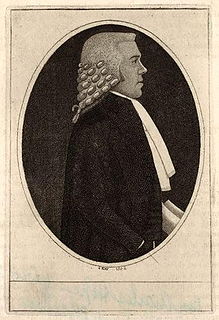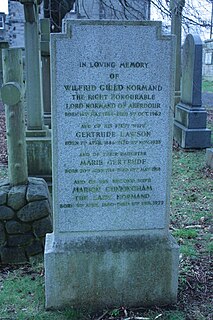 W
WThe Lord President of the Court of Session and Lord Justice General is the most senior judge in Scotland, the head of the judiciary, and the presiding judge of the College of Justice, the Court of Session, and the High Court of Justiciary. The Lord President holds the title of Lord Justice General of Scotland and the head of the High Court of Justiciary ex officio, as the two offices were combined in 1836. The Lord President has authority over any court established under Scots law, except for the Supreme Court of the United Kingdom and the Court of the Lord Lyon.
 W
WJohn Blair Balfour, 1st Baron Kinross was a Scottish lawyer and Liberal politician who sat in the House of Commons from 1880 to 1899.
 W
WRobert Blair of Avontoun FRSE (1741–1811) was a Scottish advocate and judge who served as Solicitor General for Scotland from 1789 to 1806, Dean of the Faculty of Advocates from 1801 to 1808, and Lord President of the Court of Session from 1808 to his death.
 W
WDavid Boyle, Lord Boyle FRSE was a Scottish judge.
 W
WSir Ilay Campbell, Lord Succoth LLD (1734–1823) was a Scottish advocate, judge and politician.
 W
WJames Avon Clyde, Lord Clyde, was a Scottish politician and judge.
 W
WDuncan McNeill, 1st Baron Colonsay FRSE was a Scottish advocate, judge and Tory politician. He was Lord Justice General and Lord President of the Court of Session between 1852 and 1867.
 W
WThomas Mackay Cooper, 1st Baron Cooper of Culross was a Scottish Unionist Party politician, a judge and a historian, who had been appointed Lord Advocate of Scotland.
 W
WSir Hew Dalrymple, Lord North Berwick (1652–1737) was a Scottish judge and politician.
 W
WJames Douglas, 7th Earl of Douglas, 1st Earl of Avondale, latterly known as James the Gross, and prior to his ennoblement as James of Balvenie, was a late mediaeval Scottish magnate. He was the second son of Archibald Douglas, 3rd Earl of Douglas and Joan Moray of Bothwell and Drumsargard, d. after 1408.
 W
WRobert Dundas of Arniston, the younger, FRSE was a Scottish judge. He served as Solicitor General for Scotland from 1742 to 1746, as Lord Advocate from 1754 to 1760, and as Member of Parliament for Midlothian from 1754 to 1761. He was Lord President of the Court of Session from 1760 to 1787, losing his popularity for giving his casting vote against Archibald Douglas in the famous Douglas Cause.
 W
WAndrew Graham Murray, 1st Viscount Dunedin, was a Scottish politician and judge. He served as Secretary for Scotland between 1903 and 1905, as Lord Justice General and Lord President of the Court of Session between 1905 and 1913 and as a Lord of Appeal in Ordinary between 1913 and 1932.
 W
WAlexander Seton, 1st Earl of Dunfermline (1555–1622) was a Scottish lawyer, judge and politician. He served as Lord President of the Court of Session from 1598 to 1604, Lord Chancellor of Scotland from 1604 to 1622 and as a Lord High Commissioner to the Parliament of Scotland.
 W
WDuncan Forbes of Culloden was a Scottish lawyer and Whig politician who sat in the House of Commons from 1721 to 1737. As Lord President and senior Scottish legal officer, he played a major role in helping the government suppress the 1745 Jacobite Rising.
 W
WSir John Gilmour of Craigmillar was a Scottish judge and politician, who served as Lord President of the Court of Session from 1661 to 1670. He was the son of John Gilmour, Writer to the Signet, and became an advocate on 12 December 1628.
 W
WRobert Craigie, Lord Glendoick (1685–1760) was a Scottish politician and judge. He was baptised on 4 March 1688 and died on 10 March 1760.
 W
WThomas Hamilton, 1st Earl of Haddington, designated before his peerage as 'of Drumcarny, Monkland, and Binning', was a Scottish administrator, Lord Advocate, judge, and Lord Lieutenant of Haddingtonshire.
 W
WRt Hon Lord Charles Hope FRSE was a Scottish politician and judge.
 W
WJames Arthur David Hope, Baron Hope of Craighead, is a retired Scottish judge who served as the first Deputy President of the Supreme Court of the United Kingdom from 2009 until his retirement in 2013, having previously been the Second Senior Lord of Appeal in Ordinary. He served as Convenor of the Crossbench peers in the House of Lords from 2015 to 2019.
 W
WRt Hon John Inglis, Lord Glencorse FRSE DCL LLD was a Scottish politician and judge. He was Lord President of the Court of Session (1867–1891).
 W
WSir George Lockhart of Carnwath was a Scottish advocate, judge and commissioner to parliament who was brutally murdered.
 W
WWilliam Graham, 7th Earl of Menteith, 1st Earl of Airth (c.1591–1661), was a 17th-century Scottish nobleman. A supporter of King Charles I, he held offices including Lord President of the Court of Session and was a Privy Counsellor. Although he fell from favour, he continued to support the Royal cause during the Wars of the Three Kingdoms, when his estates were damaged by the troops of Oliver Cromwell. He married Agnes, daughter of Patrick, Lord Gray, and had a son John Graham, Lord of Kinpont, who had a son William Graham, 8th Earl of Menteith who prior to his death was styled William Graham, Lord of Kinpont.
 W
WSir Thomas Miller, 1st Baronet FRSE, known as Lord Barskimming (1766–88) and Lord Glenlee during his judicial service, was a Scottish advocate, judge, politician and landowner. He was a founder member of the Royal Society of Edinburgh in 1783, and served as the Society's first Vice-President, 1783 to 1786.
 W
WWilfrid Guild Normand, Baron Normand,, was a Scottish Unionist Party politician and judge. He was a Scottish law officer at various stages between 1929 and 1935, and a Member of Parliament (MP) from 1931 to 1935. He was Lord President of the Court of Session from 1935 until he became a Law Lord in 1947.
 W
WRobert Reid was Abbot of Kinloss, Commendator-prior of Beauly, and Bishop of Orkney. He was born at Aikenhead in Clackmannan parish, the son of John Reid and Elizabeth Schanwell. His formal education began in 1511 at St Salvator's College in St Andrews University under the supervision of his uncle, Robert Schanwell, dean of the faculty of arts. Reid graduated in 1515 and by 1524 was subdean at Elgin Cathedral where, by 1527, he was Official of Moray. Thomas Chrystall, the abbot of Kinloss, chose Reid as his successor in 1526. In 1527, as abbot-designate, he attended the court of Pope Clement VII on abbacy business. While returning via Paris in 1528, Reid met the Piedmontese humanist scholar Giovanni Ferrerio who accompanied him back to Scotland. Following Chrystall's resignation in July 1528, Reid was blessed as abbot in September and received the Priory of Beauly, in commendam, in 1531. In that same year, Ferrerio left the court of James V to join Reid at Kinloss as tutor to the monks of both Kinloss and Beauly. Reid held many offices of state between 1532 and 1542 including ambassadorial roles to England and France and as a senior law official. He considerably improved the external and internal fabric of both monasteries in 1538.
 W
WAlan Ferguson Rodger, Baron Rodger of Earlsferry was a Scottish academic, lawyer, and Justice of the Supreme Court of the United Kingdom.
 W
WJames Dalrymple, 1st Viscount Stair, Scottish lawyer and statesman, was born at Drummurchie, Barr, Ayrshire.
 W
WAlexander Ure, 1st Baron Strathclyde, was a Scottish politician, judge, and georgist land value tax activist.